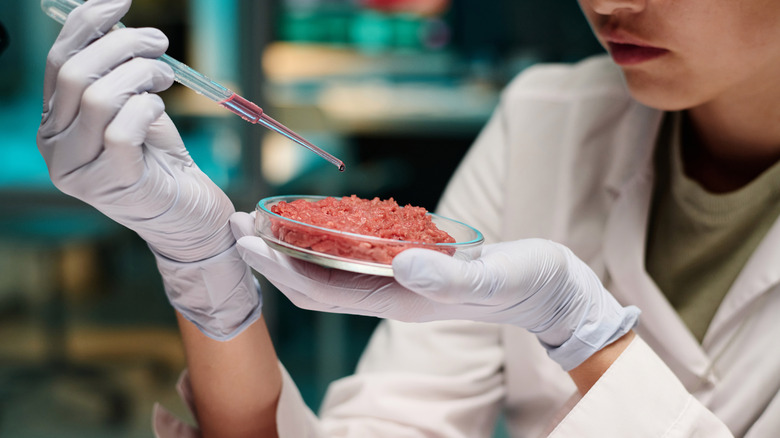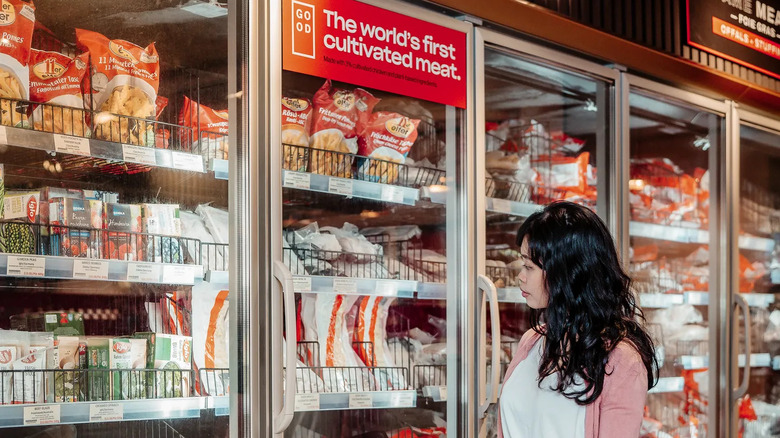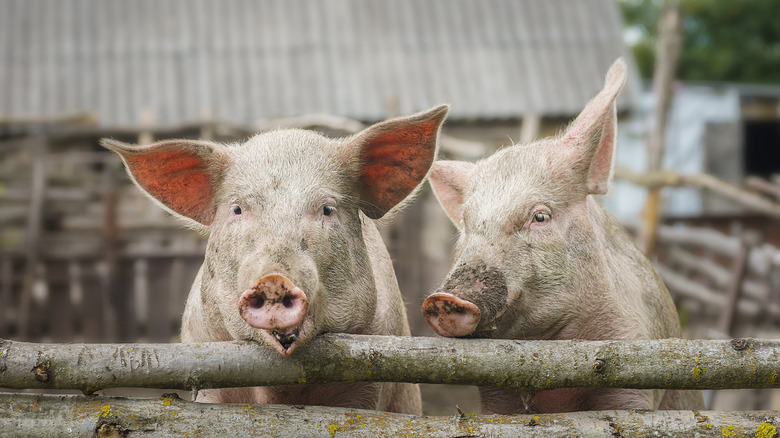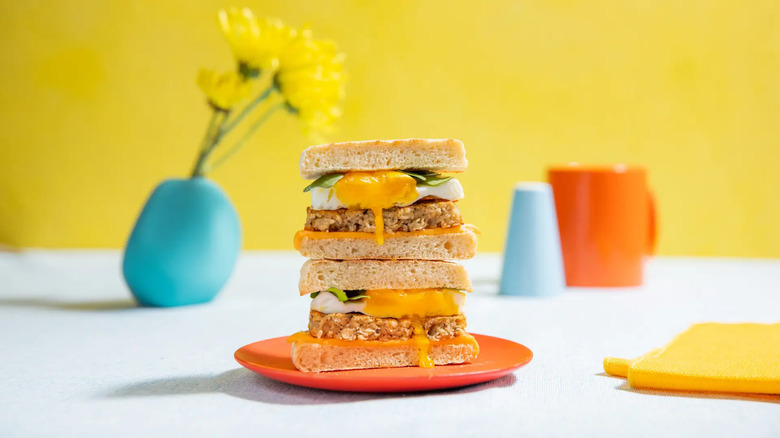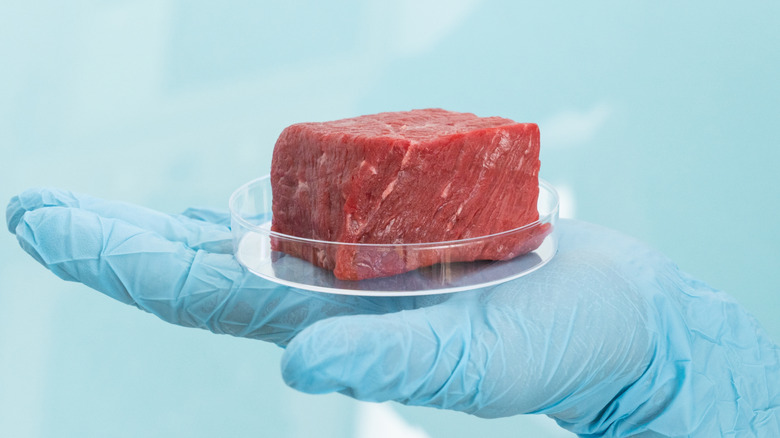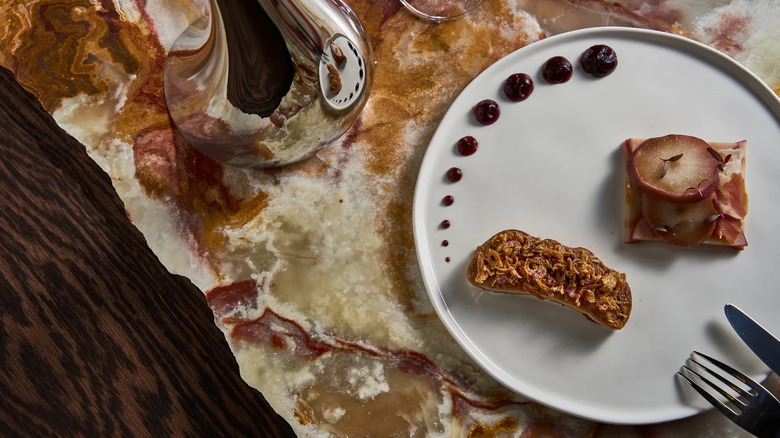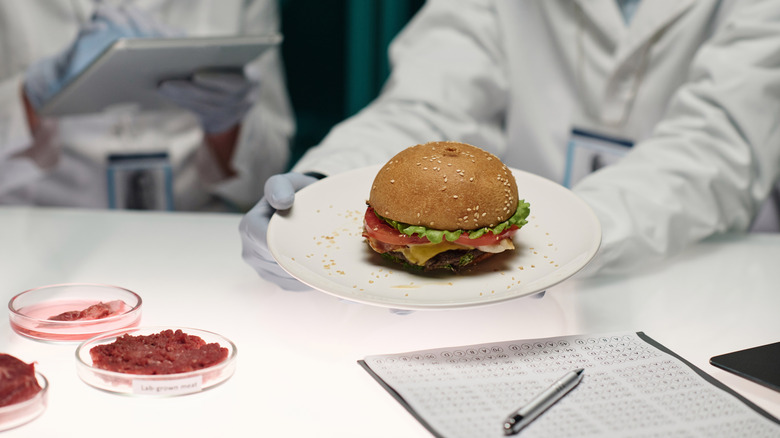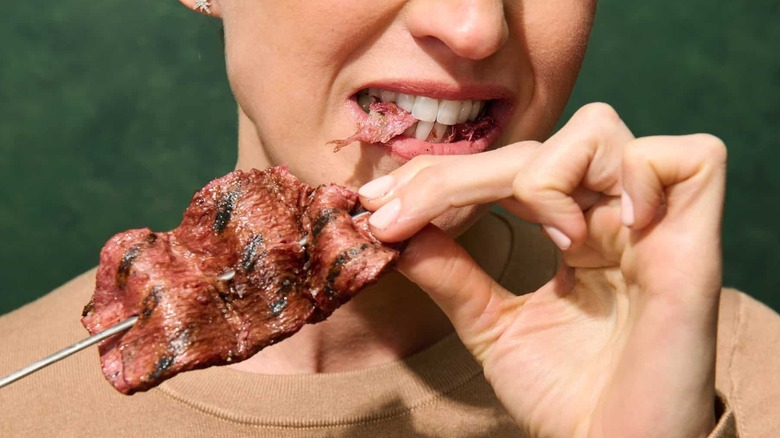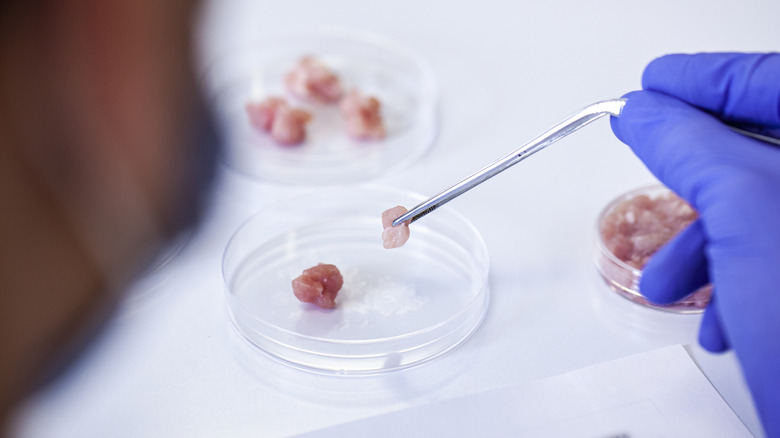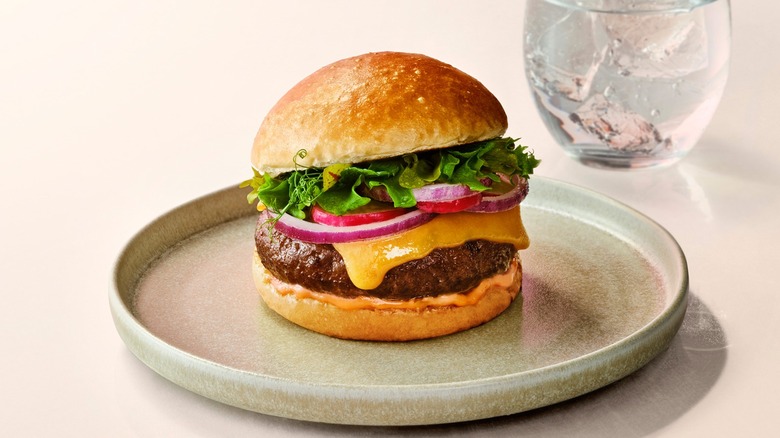6 Places That Have Approved Cultivated Meat And 5 That Have Banned It
Right now, most of the world's food system relies on animal agriculture. Without the farming of livestock, like cows, chickens, and pigs, there would be no meat products, like burgers, nuggets, and sausages, on the shelves. It seems simple: No farmed animals, no meat. But actually, in the future, that might not be the case.
All over the world, food scientists are embracing a new type of technology that allows them to take cells from live animals and nurture them in bioreactors with nutrients. In the bioreactors, the cells form connective tissue, muscle, and fat. In a nutshell: They become meat — no slaughterhouses and no industrialized farms required.
This type of meat is often called cultivated meat, although it is also known as cell-based meat or lab-grown meat. It is notably different to plant-based meat, which is made with plant-based ingredients, not animal cells. If scaled successfully, cultivated meat would provide the world with protein, while reducing the number of farmed animals on the planet (and crucially, the amount of land and resources needed to sustain those animals).
But this emerging industry is not without controversy. Many are concerned about the impact that cultivated meat would have on farmers, for example, while others are not yet convinced about the safety of eating meat grown in a lab. All over the world, countries are taking different approaches to cultivated meat. Some have embraced it with open arms, while others have shut the door. Keep reading to find out more.
Singapore has approved the sale of cultivated chicken
In November 2020, Singapore made history when it became the first country to grant cultivated meat regulatory approval. Specifically, the Singapore government allowed Eat Just — a San Francisco-based company known for its vegan liquid egg products — to sell cultivated chicken in restaurants.
Following this approval, Eat Just, which produces the cultivated chicken through its dedicated cultivated meat offshoot, Good Meat, began selling in a Singapore restaurant called 1880 in December 2020. More than four years later, you can still buy Good Meat's cultivated chicken in Singapore. Only now, you'll need to head to Huber's Butchery and Bistro. There, for the very first time, customers can order cultivated chicken to take home to cook in their own kitchens. Currently, the chicken is made with 3% cultivated meat, while the rest is made up of plant-based ingredients. Good Meat isn't alone. In April 2024, the Singapore Food Agency granted approval to cultivated quail meat, produced by the Australian-based cultivated meat company Vow.
The meat is made with cells from a Japanese quail species, called Coturnix japonica, and then crafted into two products by Vow's offshoot, Forged by Vow. The products are Forged Parfait and Forged Gras (which is like the French delicacy foie gras, but made with cultivated quail meat instead). Right now, cultivated quail is on the menu at a handful of Singapore eateries, including the Mandala Club, Restaurant Fiz, and Black Cow.
Italy bans cultivated meat to protect farmers
In 2023, farmers celebrated as Italy became the first country in the world to ban cultivated meat. They were concerned that, if allowed to grow, the industry would go on to impact their profits. At the time, the law was passed with 159 votes to 53, and anyone who violated it by producing, importing, or selling cultivated meat would face a fine of up to €60,000 (around $62,500 USD).
Italy's Agriculture Minister Francesco Lollobrigida said at the time the ban would protect the country from the "social and economic risks of synthetic food," per the BBC. He added that Italy was conserving the relationship with food and human labour "that we have enjoyed for millennia."
But, in reality, an Italian ban on the cultivated meat industry isn't that straight forward. Italy, which is a member of the European Union (EU), did not submit the ban for approval to the European Commission. This is despite the fact that an Italian ban on cultivated meat could impact the entire European single market — not just Italy. If the EU, which is currently considering its position on cultivated meat, decides to allow companies to produce and sell cultivated meat products, Italy's ban could be challenged by the European Commission. Ultimately, this means that its ban could be unenforceable in the future. The Good Food Institute (GFI), a nonprofit that advocates for alternative proteins and a sustainable food system, has called Italy's attempt to ban cultivated meat "disproportionate and unfair."
The U.S. has approved cultivated meat
Singapore isn't alone. In 2023, the U.S. became the second country in the world to approve cultivated meat. The Food and Drug Administration (FDA) and the U.S Department of Agriculture (USDA) specifically gave the nod to two companies: California-based Upside Foods (formerly known as Memphis Meats) and Good Meat.
Both specialize in chicken but are working on new products. Upside Foods, for example, claims it has breakfast sausages in the works, and it has also developed cultivated duck and meatballs in the past. In 2022, after it had submitted its application to the FDA but before the U.S. gave regulatory approval, Good Meat began building the world's largest bioreactors to produce both cultivated chicken and beef. According to the company, the bioreactors can grow more than 13,000 tonnes of cultivated meat a year.
Now, due to the U.S. approval, it is possible to try cultivated chicken in a selection of eateries across the country. In December 2024, New York City restaurant Wildair hosted a tasting session for Upside Foods' Upside Chicken.
Good Meat has paused its tastings for now, but in July 2023, it also partnered with Chef José Andrés to serve cultivated chicken at his Washington D.C. restaurant China Chilcano. The chicken was paired with native potatoes and anticucho sauce and served to diners in a Peruvian dish called Anticuchos de Pollo.
Florida and Alabama have banned cultivated meat
Not everyone was pleased by the USDA and FDA's decision to grant approval to cultivated meat companies. In May 2024, Republican governor Ron DeSantis took the decision to go against the federal agencies and ban cultivated meat in the state of Florida.
In a statement at the time, DeSantis said that Florida was "fighting back" against the emerging cultivated meat industry and the "global elite's plan to force the world to eat meat grown in a petri dish," notes the BBC. He added that the ban was a sign that the state was "standing with the cattle ranchers." At the same time, DeSantis also expressed his position against the growing edible insect market.
Also in May 2024, Alabama joined Florida and passed a statewide ban on cultivated meat. The bill, which was signed into law by the state's Republican governor Kay Ivey, was lauded by the Alabama Cattlemen's Association. The Vice President of the organization Erin Beasley said in a statement at the time that the "tireless efforts" of Republican Senator Jack Williams and State Representative Danny Crawford, who sponsored the bill to ban cultivated meat, would "protect consumers in Alabama" and ensure they could "continue to purchase safe, wholesome, real beef."
Other states that have moved to ban or moderate the cultivated meat industry include Arizona and Texas. Texas, for example, passed a law in 2023 that would require all cultivated meat products to be labeled clearly with words like "lab-grown" or "cell-cultured."
Hong Kong has approved the sale of cultivated quail
In November 2024, Hong Kong also took the decision to allow cultivated meat when it granted regulatory approval to Vow's cultivated quail products. As a result, both Forged Parfait and Forged Gras were initially available to diners at an izakaya restaurant in the Mandarin Oriental hotel called The Aubrey.
Forged Parfait and Forged Gras contain a mix of cultivated quail and plant-based ingredients. Forged Gras, for example, contains ingredients like fava bean protein, konjac, carrageenan, and yeast extract. All work together with the quail to deliver a product that tastes just like foie gras — only it does not require real meat from ducks or geese.
Unlike Hong Kong, Mainland China has not currently given approval to cultivated meat, but it is looking likely that it will happen soon. In September 2024, the country signed a $300 million cultivated meat trade agreement with Israel. The agreement will enable China and Israel to collaborate on the growth and development of the cultivated meat market.
Israel is currently a hub of cultivated meat innovation. It is home to several leading companies in the industry, including Aleph Farms, Super Meat, and Believer Meats. But innovation is also happening in mainland China. In July 2024, for example, researchers in Beijing revealed that they had worked out how to embed cultured meat cells from pork and chicken into grains of rice. The result is a novel hybrid food product that combines cultivated protein with carbohydrates.
Romania is in the process of trying to ban cultivated meat
In October 2023, Romania took its first steps toward joining Italy when the country's Senate unanimously voted to ban the sale of any cultivated meat. At the time, the law dictated that anyone who sells meat grown in a lab will be subject to a fine.
However, as with Italy, Romania's journey to outlaw the cultivated meat industry will not be as straight forward as it might like. Romania is a member of the EU, which means that the ban is also likely in breach of the European single market.
Environmental organization Greenpeace's investigative journalist platform Unearthed has expressed concern that the livestock industry is attempting to block the approval of cultivated meat products in Europe, including in Romania. In July 2024, Unearthed revealed that, with Follow The Money, a Dutch investigative journalism website, it had jointly investigated livestock executive links to anti-cultivated meat campaigns. It claims that in Romania, for example, one senator who played a key role in passing the ban is not only the owner of a pork farm, but also the vice president of the Romanian pork lobby.
There have been no further updates on the Romanian ban's progress since 2023, despite the fact that it was supposed to move on to Romania's Chamber of Deputies for debate in September 2024. The Chamber of Deputies is the second half of Romania's Parliament, after the Senate.
Israel has approved the sale of cultivated beef
As aforementioned, Israel is a key player in the growth of the cultivated meat industry. So it makes sense that, in December 2023, the country also granted approval for the sale of cultivated meat. While other countries have focused on chicken or quail, Israel approved cultivated beef, making it the first country in the world to do so.
The meat in question was created by Aleph Farms, a startup that has been working on developing cultivated products since 2017. In January 2024, the company revealed that it had been sent a "No Questions" letter from Israel's Ministry of Health in the previous December. In short, this letter meant that the government agency was satisfied that Aleph Farms' cultivated beef is safe to sell to the public. The first product that has been approved from the company is its Cultivated Petit Steak — a bite-sized cut of cultivated steak. Right now, the product is listed as "coming soon" on the Aleph Farms website.
Another notable Israeli cultivated meat company is Believer Meats. It's headquartered in Rehovot, Israel, but it has focused much of its product development in the U.S. For example, in 2022, it started work on its first commercial-scale production factory in North Carolina. The company hopes that when complete, the facility will be capable of producing 26 million pounds of food every year.
Hungary tried to ban cultivated meat unsuccessfully
Hungary has attempted to ban the sale of cultivated meat, however it has not yet been successful. Like Italy and Romania, it is a member of the EU, which means that any laws passed against cultivated meat without EU approval may be in violation of the European Single Market.
Hungary notified the EU Commission that it was intending to ban cultivated meat in July 2024. It justified by the proposal by stating that the ban would protect "human health and the environment" and preserve "the traditional rural way of life." However, in October 2024, the European Commission and EU member states Czechia, Lithuania, the Netherlands, and Sweden shot down the ban after a review.
The Netherlands, for example, stated in a comment on Hungary's ban proposal that an "absolute ban" is not "proportionate," given that cultivated meat is not yet for sale anywhere in the EU. Sweden's comment mirrored that of the Netherlands, noting that the proposal "lacks a proportionality assessment." In its own response, the European Commission called Hungary's ban "unnecessary" and "unjustified." International food awareness nonprofit ProVeg International praised the response of EU member states and the EU Commission. Julie Martin, the organization's cellular agriculture lead, said that any bans on cultivated meat "are not founded on substantial scientific evidence," since the technology is still in development.
The UK has approved the sale of cultivated meat for pet food
In July 2024, the U.K. became the first country in Europe to approve cultivated meat. But there's one catch: Right now, it's for pet food, not human consumption. The U.K. is no longer a member of the EU, which means it did not have to put forward any cultivated meat laws to the European Commission.
Both the U.K.'s Department for Environment, Food and Rural Affairs and the Animal and Plant Health Agency (the government agency in charge of safeguarding the health of animals) granted approval to cultivated meat products from Meatly. Based in the U.K., Meatly has developed food for dogs and cats using cultivated chicken. The brand is hoping to launch the product to market in 2025. The brand's CEO Owen Ensor said in a statement in July that the U.K.'s approval marked "a significant milestone for the European cultivated meat industry."
In February 2024, before the approval of cultivated pet food, prestigious London department store Fortnum and Mason hosted a tasting for a scotch egg made with cultured meat. The store did not have government approval to sell the meat. Instead, it was given to members of the press for free. The beef in the scotch egg was made by Ivy Farm Technologies, another U.K. cultivated meat brand. The brand is hoping to one day become the leading producer of cultivated meat in the U.K. and around the world.
The Netherlands approves cultivated meat for tastings
In a major EU milestone, in July 2023, the Netherlands became the first of the member states to allow pre-market tastings for cultivated meat. This doesn't mean that the Netherlands can sell cultivated products, but it does mean that cultivated meat companies can host tastings in the country.
This is particularly significant for the Netherlands — cultivated meat already has a rich history in the country. In fact, in 2013, it was Mark Post, a Dutch scientist, who created the first-ever cultivated beef burger. Together with food technician Peter Verstrate, Post co-founded Mosa Meat, which remains one of the Netherlands biggest cultivated meat companies.One year after the Dutch government's approval, Mosa Meat hosted the first tasting of its cultivated beef in Maastricht in the Netherlands in July 2024. It was also the first time that a cultivated meat product had been tasted inside an EU country. At the time, Mosa Meat's CEO Maarten Bosch said the tasting was an important part of the product development process.
